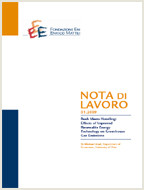Risky Activities and Strict Liability Rules: Delegating Safe

04.09.2010
Gérard Mondello
K0, K32, Q01, Q58
Environment, Strict Liability, Ex-Ante Regulation, Ex-Post Liability, Judgment-Proof, Environment Law, CERCLA, Environmental Liability
Climate Change and Sustainable Development
Carlo Carraro
This paper studies the delegation of activities that pose serious risks to health and the environment in an economy regulated by strict liability schemes. Strict liability induces judgment-proof possibilities. Two civil liability regimes are then compared: a strict liability scheme and a capped strict liability one. The argument is led under a twofold asymmetric information assumption between the principal and the agent: the efficiency level in effort for safety and the agent’s level of wealth. The paper shows that standard strict liability under information asymmetries deters the efficient agent to compete and favors adverse selection. Then, under conditions, a capped strict liability regime is a better regime than a standard strict liability one because it induces the efficient agent to supply the level of safety effort equivalent to the first best solution. The counterpart is the perception of an informational rent by the efficient agent. At the optimum, this rent is minimized by the efficient contract supplied by the principal.
